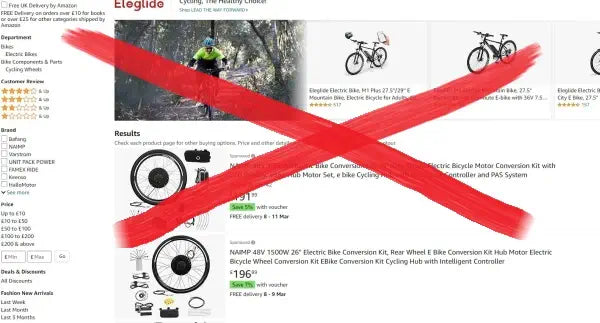
Opinion: Never ‘modify’ your Ebike
It’s something we get asked about all the time. UK Legal Electric Bikes are restricted to assist riders’ (while pedalling only) upto no more than 15.5mph or 25kmh. Can you ‘de-restrict’ my Ebike? Yes we can but we categorically don’t and won’t for good reason. Let’s dig into the detail why I think you should never modify or convert your Ebike.
If you have done any Ebike research online it’s almost inevitable you’ve come across kits that will remove the 15.5mph assisted limit without the need for pedalling either. For a lot of people 15.5mph is actually a touch too slow so nobody will blame you for wanting a bit more assisted speed. But it’s that speed for a reason.
The reality is, if you walk or cycle in any UK city these days you will have seen delivery riders darting about at abnormal speeds without pedalling. Most of them identified by DIY ebike conversion kits adorning an old standard bicycle.
For delivering goods or food, as most do, speed is everything. If you can catch one and ask them, that effectively means more money at the end of the day. So you can see why it happens.
However, for very good reasons, these bikes are not only illegal but potentially dangerous to ride and to other road users and pedestrians too. Shortcuts via pedestrianised areas at speed without impunity seems to be the norm. A recipe for disaster.
Mechanical failure
The dangers posed by a mechanical failure at speed doesn’t really need to be spelled out. In fact an EU wide ban on the sale of speed and conversion kits is being called for, such is the industry’s worry about them.
To the uneducated, calling for a ban on a little extra speed may seem draconian given other vehicles on the road can go so much faster. So what’s the big deal?
Bike components (wheels, rims, brakes and frames) ok at normal speeds are probably untested at abnormally higher speeds and risk failure. An ebike hitting a hole in the road at 20mph may be fine. At 30-40mph, mechanical failure becomes more possible. Bikes and brakes are just not designed for those kinds of speed.
Further Reading
Speed is directly related to the kinetic energy of a moving object. If you double your speed, the energy required to slow or stop your bike will go up by a factor of four. Pads will wear out quicker, get hotter quicker reducing performance more quickly too. Vehicles that have exponentially more Kinetic energy due to weight and higher speeds have tested brake systems that work. For Ebikes it’s the unknown. Comparison to vehicles to justify them is fatally flawed (pun intended!).
Additionally the extra forces propelling you must be considered too. They will place higher torque on your transmission components and motor not designed for it. The chance of failure simply increases as does the potential cost of repair. It’s also important to point out that any speed modification or conversion renders your manufacturers warranty void. No exceptions.
Illegal Ebikes are increasingly being refused by local bike shops too. They don’t want the liability and risk of working on them. Working on a modified bike could see them void their liability insurance notwithstanding aiding a potential offence. And if you can’t get your bike fixed by a professional, the risk of mechanical failure increases again if you go DIY.

Modifying an Ebike is Dangerous to others
My biggest fear is simply how dangerous they are for the riders and others. The riders are generally inexperienced, usually carrying unbalanced weight on their backs and not doing it for the love of the job. They need the money. The pay is around minimum wage so taking shortcuts either with their bikes or literally to deliver their cargo just puts them in and others in flat danger. The amount of riders I see riding among pedestrians in areas where cycling is not allowed or on shared paths makes me worry. People get hurt and recent e-scooter deaths are an example of what can happen. Something needs to be done about them.
If wages are low, you can guarantee the quality of the kit fitted to their bike will cheap and low quality too. This risks fire, ideally outside if it happens but, more worryingly, inside when on charge too. And that puts others in the same building at risk. Tut tut.
I must stress that all conversion kits are not created equal though; some are good and actually legal. Kits that modify Ebikes from the likes of Swytch, Boost, Pendix and Copenhagen Wheel are fine. They adhere to the regulations and UK law. Illegal and poor quality kits tend to be sold on online marketplaces.
Risk of Fire
Sealed batteries from mainstream manufacturers are safe. Unqualified tampering of electrics and battery cells on a DIY Ebike produces a very real risk of thermal runaway and fire. The damage caused by this can be devastating.
DIY battery systems are very often large, may have higher voltage. Often they are not equipped with the safety features found on the likes of, say, Bosch and Yamaha systems for example.
Electric bikes draw high currents (amperes) and thus messing with an electrical circuit without knowing what you’re doing can risk a short-circuit and fire.
Reputation
Do modified, illegal Ebikes risk jeopardising the whole industry? I hope not but it’s definitely possible. With our media happy to peddle (pun not intended!) ill-informed Ebike stories about accidents and fires, the narrative around electric bikes, in general, will continue to be tainted. It’s imperative a distinction between illegal and legal electric bikes is always made in the press. In law it’s there and should be enforced otherwise the threat to riding electric bikes as a whole is real through over-reaching scrutiny from law makers looking to appease the masses.
Electric Bikes are great. Even the riders on illegal ones will tell you that. But the irony is while we allow unqualified, DIY speed modifications to them, we create danger to riders, others and the industry as a whole.
Don’t modify your EBike.
